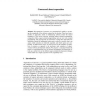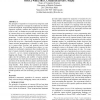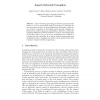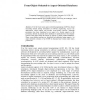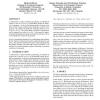102
click to vote
FASE
2006
Springer
15 years 5 months ago
2006
Springer
Abstract. The separation of concerns, as a conceptual tool, enables us to manage the complexity of the software systems that we develop. There have been a number of approaches aime...
121
Voted
AOSD
2007
ACM
15 years 6 months ago
2007
ACM
This paper proposes an approach called SCoPE, which supports user-defined analysis-based pointcuts in aspect-oriented programming (AOP) languages. The advantage of our approach is...
133
click to vote
OOPSLA
1999
Springer
15 years 6 months ago
1999
Springer
The Advanced Teaching and Learning Academic Server (Atlas) is a software system that supports web-based learning. Students can register for courses, and can navigate through perso...
151
click to vote
ICSE
1999
IEEE-ACM
15 years 6 months ago
1999
IEEE-ACM
The principle of separation of concerns has long been used by software engineers to manage the complexity of software system development. Programming languages help software engin...
118
click to vote
GCSE
1999
Springer
15 years 6 months ago
1999
Springer
Aspect-orientedprogramming provides theprogrammer with means to cross-cut conventional program structures, in particular the class hierarchies of object-oriented programming. This ...
110
click to vote
DEXA
2000
Springer
15 years 6 months ago
2000
Springer
Over the recent years aspect-oriented programming (AOP) has found increasing interest among researchers in software engineering. Aspects are ions which capture and localise cross-c...
188
click to vote
SAIG
2001
Springer
15 years 6 months ago
2001
Springer
A characteristic of aspect-oriented programming, as embodied in AspectJ, is the use of advice to incrementally modify the behavior of a program. An advice declaration specifies a...
122
click to vote
WORDS
2002
IEEE
15 years 7 months ago
2002
IEEE
The design and implementation of distributed real-time dependable systems is often dominated by non-functional considerations like timeliness, object placement and fault tolerance...
133
click to vote
WORDS
2003
IEEE
15 years 7 months ago
2003
IEEE
Despite of the proliferation of object-oriented and component technology, their application to real-time operating systems (RTOS) has been limited since most design concerns in RT...
OOPSLA
2004
Springer
15 years 7 months ago
2004
Springer
In this paper we present aspect-oriented programming laws that are useful for deriving refactorings for AspectJ. The laws help developers to verify if the transformations they de�...
